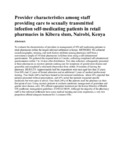| dc.contributor.author | Kwena, Z | |
| dc.contributor.author | Sharma, A | |
| dc.contributor.author | Wamae, N | |
| dc.contributor.author | Muga, C | |
| dc.contributor.author | Bukusi, EA | |
| dc.date.accessioned | 2013-06-12T14:09:06Z | |
| dc.date.available | 2013-06-12T14:09:06Z | |
| dc.date.issued | 2008-05 | |
| dc.identifier.citation | Sex Transm Dis. 2008 May;35(5):480-3. doi: 10.1097/OLQ.0b013e3181644b84 | en |
| dc.identifier.uri | http://hinari-gw.who.int/whalecomwww.ncbi.nlm.nih.gov/whalecom0/pubmed/18360315 | |
| dc.identifier.uri | http://erepository.uonbi.ac.ke:8080/xmlui/handle/123456789/32422 | |
| dc.description.abstract | OBJECTIVES:
To evaluate the characteristics of providers in management of STI self-medicating patients in retail pharmacies within the largest informal settlement in Kenya.
METHODS:
We collected sociodemographic, training, and work history attributes among pharmacy staff from a convenience sample of 50 retail pharmacies in Kibera slum using a self-administered questionnaire. We gathered the required data in 8 weeks, collecting completed self-administered questionnaires within 7 to 14 days after distribution. Two data collectors subsequently presented at these pharmacies as mystery patients seeking care for symptoms of genital ulcer disease and gonorrhea and completed a structured observation form within 10 minutes of leaving the pharmacy.
RESULTS:
Approximately half the respondents were men aged less than 28 years. Over 90% had 12 years of formal education and an additional 3 years of medical professional training. Two thirds (66%) had been trained in Government institutions. About 65% reported that patients presented without prescriptions, and 45% noted that patients requested specific medicines but were open to advice. One-third (36%) of the patients used the pharmacy as their first point of care. Using mystery patients to evaluate syndromic management of gonorrhea and genital ulcer disease, only 10% offered appropriate treatment per the Kenya Ministry of Health STI syndromic management guidelines.
CONCLUSION:
Although the majority of the pharmacy staff in this informal settlement have some medical training and some experience, a very low proportion offered adequate treatment for 2 common STIs | en |
| dc.language.iso | en | en |
| dc.publisher | University of Nairobi. | en |
| dc.title | Provider characteristics among staff providing care to sexually transmitted infection self-medicating patients in retail pharmacies in Kibera slum, Nairobi, Kenya | en |
| dc.type | Article | en |
| local.publisher | College of Health science | en |

